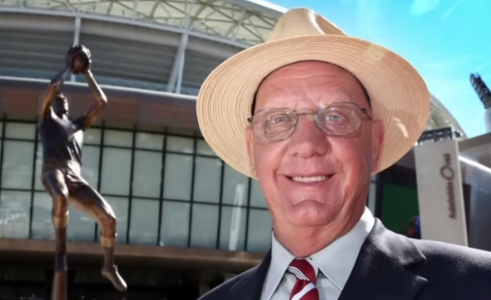Footy (77) great’s passing sparks fresh reflection on untold legacy
By
Gian T
- Replies 0
The sporting world is mourning the loss of a figure whose name came to symbolise both talent and dedication.
For many fans, this individual represented the heart of the game itself, remembered for skill and character.
Messages of respect and remembrance are now flowing from across the nation.
Barrie Robran’s football journey is the stuff of legend. Born in Whyalla in 1947, Robran’s early years were marked by a humble upbringing and a family steeped in sporting talent.
His brother also donned the North Adelaide colours, while his sister captained the national netball team, though Barrie himself would become the family’s most celebrated athlete.
Robran’s footballing prowess was evident from a young age. He played A-grade football for North Whyalla in the Spencer Gulf League before being recruited by North Adelaide, making his senior debut in 1967.
Over the next 13 years, he would play 201 games for the Roosters, winning three Magarey Medals (1968, 1970, 1973), two SANFL premierships (1971, 1972), and an astonishing seven club best-and-fairest awards.
He also represented South Australia 17 times, captaining the state side and earning the respect of teammates and rivals alike.
What set Robran apart wasn’t just his on-field brilliance, though he had that in spades.
He was a high-marking, two-sided player with a football IQ that left opponents and fans in awe.
But it was his humility and sportsmanship that truly defined him. North Adelaide described him as 'an icon, a mentor, and a true gentleman whose presence enriched everyone around him.'
Port Adelaide’s Josh Carr echoed this sentiment, calling Robran 'probably the nicest man you’d ever meet.'
His impact was so profound that, in 2014, a statue of Robran leaping for a mark was unveiled outside Adelaide Oval.
Following news of his passing, fans transformed the statue into a spontaneous shrine, draping it in North Adelaide colours and leaving flowers in tribute.
Robran’s career was not without its challenges. In 1974, while captaining South Australia, he suffered a devastating knee injury in a clash with Leigh Matthews—a moment that, by his own admission, 'probably cost me about 150 league games.'
Despite this setback, Robran’s achievements remained unparalleled. He famously turned down repeated offers to play in the VFL, choosing instead to stay loyal to his home state.
In 1996, Robran became the first South Australian inducted into the Australian Football Hall of Fame, and in 2001, he was elevated to legend status.
The accolades speak for themselves, but perhaps more telling are the words of those who watched him play.
'Those who were lucky enough to see him play were awestruck by his brilliant performances,' reads the North Adelaide website.
Robran’s sporting legacy lives on through his family. He is survived by his wife Taimi and two sons, Jonathon and Matthew, who played in the AFL.
Matthew, in particular, followed in his father’s footsteps as a dual premiership player with Adelaide, ensuring the Robran name remains etched in football history.
The outpouring of grief and admiration following Robran’s death has been overwhelming. North Adelaide’s CEO Craig Burton declared, 'We think he’s number one, the greatest-ever footballer to play.'
AFL CEO Andrew Dillon called it 'a sad day' for South Australian football, noting that 'any South Australian who saw Robran play simply defers to him as the greatest.'
Port Adelaide legend John Cahill reflected on the era of Robran and his great rival Russell Ebert, saying, 'They were humble, talented and most of all, just wonderful people.'
The SANFL and the SA Football Commission also paid heartfelt tributes, describing Robran as 'a true legend in South Australian footy, and a true gentleman.'
Despite his fame, Robran never lost sight of his roots. He often spoke fondly of his upbringing in Whyalla, crediting his family and community for shaping his character.
'We had a very humble upbringing in Whyalla,' he once said. 'But I’m sure, given the opportunity, we wouldn’t change any of that.'
Robran’s story reminds us that greatness isn’t measured in medals and trophies but in the way a person carries themselves, on and off the field.
His quiet grace, humility, and commitment to his club and state made him a role model for generations of players and fans.
As the football world mourns Barrie Robran, his legacy endures—not just in statues or record books, but in the memories of those who saw him play and the countless young athletes inspired by his example.
He showed us that true greatness is about more than just talent; it’s about character, loyalty, and the ability to lift those around you.
Credit: YouTube

Have you got memories of watching Barrie Robran play, or stories about his impact on your club or community? We’d love to hear your thoughts and tributes in the comments below. Let’s celebrate the life of a true Aussie legend together.
Rest in peace, Barrie Robran. You were more than a champion—you were the heart and soul of South Australian football.
Read more: AFL community mourns loss of legendary figure at 67
For many fans, this individual represented the heart of the game itself, remembered for skill and character.
Messages of respect and remembrance are now flowing from across the nation.
Barrie Robran’s football journey is the stuff of legend. Born in Whyalla in 1947, Robran’s early years were marked by a humble upbringing and a family steeped in sporting talent.
His brother also donned the North Adelaide colours, while his sister captained the national netball team, though Barrie himself would become the family’s most celebrated athlete.
Robran’s footballing prowess was evident from a young age. He played A-grade football for North Whyalla in the Spencer Gulf League before being recruited by North Adelaide, making his senior debut in 1967.
Over the next 13 years, he would play 201 games for the Roosters, winning three Magarey Medals (1968, 1970, 1973), two SANFL premierships (1971, 1972), and an astonishing seven club best-and-fairest awards.
He also represented South Australia 17 times, captaining the state side and earning the respect of teammates and rivals alike.
What set Robran apart wasn’t just his on-field brilliance, though he had that in spades.
He was a high-marking, two-sided player with a football IQ that left opponents and fans in awe.
But it was his humility and sportsmanship that truly defined him. North Adelaide described him as 'an icon, a mentor, and a true gentleman whose presence enriched everyone around him.'
Port Adelaide’s Josh Carr echoed this sentiment, calling Robran 'probably the nicest man you’d ever meet.'
His impact was so profound that, in 2014, a statue of Robran leaping for a mark was unveiled outside Adelaide Oval.
Following news of his passing, fans transformed the statue into a spontaneous shrine, draping it in North Adelaide colours and leaving flowers in tribute.
Robran’s career was not without its challenges. In 1974, while captaining South Australia, he suffered a devastating knee injury in a clash with Leigh Matthews—a moment that, by his own admission, 'probably cost me about 150 league games.'
Despite this setback, Robran’s achievements remained unparalleled. He famously turned down repeated offers to play in the VFL, choosing instead to stay loyal to his home state.
In 1996, Robran became the first South Australian inducted into the Australian Football Hall of Fame, and in 2001, he was elevated to legend status.
The accolades speak for themselves, but perhaps more telling are the words of those who watched him play.
'Those who were lucky enough to see him play were awestruck by his brilliant performances,' reads the North Adelaide website.
Robran’s sporting legacy lives on through his family. He is survived by his wife Taimi and two sons, Jonathon and Matthew, who played in the AFL.
Matthew, in particular, followed in his father’s footsteps as a dual premiership player with Adelaide, ensuring the Robran name remains etched in football history.
The outpouring of grief and admiration following Robran’s death has been overwhelming. North Adelaide’s CEO Craig Burton declared, 'We think he’s number one, the greatest-ever footballer to play.'
AFL CEO Andrew Dillon called it 'a sad day' for South Australian football, noting that 'any South Australian who saw Robran play simply defers to him as the greatest.'
Port Adelaide legend John Cahill reflected on the era of Robran and his great rival Russell Ebert, saying, 'They were humble, talented and most of all, just wonderful people.'
The SANFL and the SA Football Commission also paid heartfelt tributes, describing Robran as 'a true legend in South Australian footy, and a true gentleman.'
Despite his fame, Robran never lost sight of his roots. He often spoke fondly of his upbringing in Whyalla, crediting his family and community for shaping his character.
'We had a very humble upbringing in Whyalla,' he once said. 'But I’m sure, given the opportunity, we wouldn’t change any of that.'
Robran’s story reminds us that greatness isn’t measured in medals and trophies but in the way a person carries themselves, on and off the field.
His quiet grace, humility, and commitment to his club and state made him a role model for generations of players and fans.
As the football world mourns Barrie Robran, his legacy endures—not just in statues or record books, but in the memories of those who saw him play and the countless young athletes inspired by his example.
He showed us that true greatness is about more than just talent; it’s about character, loyalty, and the ability to lift those around you.
Credit: YouTube
Key Takeaways
- Australian rules football legend Barrie Robran has died aged 77, prompting an outpouring of tributes from across the football community.
- Robran is widely considered South Australia's greatest-ever footballer, winning three Magarey Medals, two SANFL premierships, and being a seven-time North Adelaide best-and-fairest.
- North Adelaide and the wider SANFL community have remembered Robran as an icon, mentor, and true gentleman, with his statue at Adelaide Oval turned into a shrine after news of his passing.
- Robran’s legacy lives on through his many achievements, his sporting family, and the high esteem in which he is held as a humble and inspirational figure in Australian football.
Rest in peace, Barrie Robran. You were more than a champion—you were the heart and soul of South Australian football.
Read more: AFL community mourns loss of legendary figure at 67








